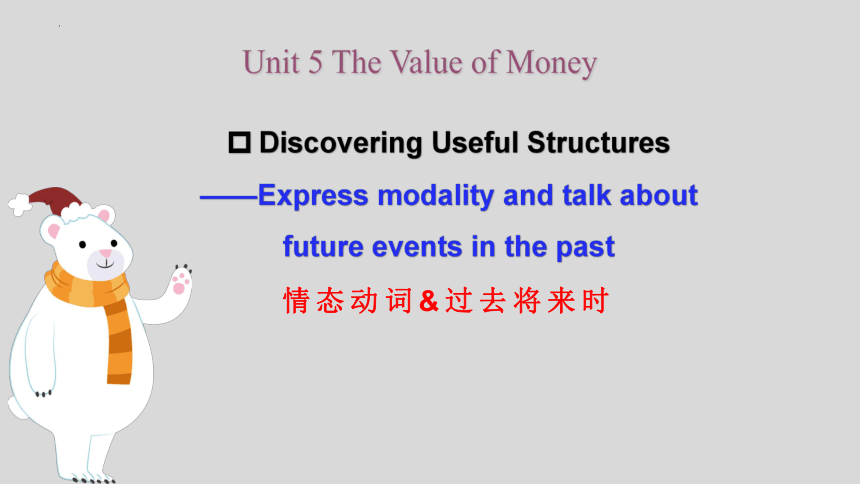(
课件网) Unit 5 The Value of Money Discovering Useful Structures ———Express modality and talk about future events in the past 情态动词&过去将来时 情态动词 can could may might must shall should ought to will would can 和 could 1. 表示“能力”。 could表示过去具备的能力。 be able to 表示具体情况下具有的能力,并且做了某动作。 be able to 除有一般现在时、一般过去时、一般将来时外,还可有现在完成时、不定式、动词-ing 形式等。 She can drive,but she can’t ride a bicycle. I could swim all the way across the lake,but I can’t now. This is the information I’ve been able to get so far. can 和 could 2)can't 表猜测。只用于否定句,疑问句和感叹句。 can't表示“一定不”。 现在的状态 can’t do/be 现在正进行的动作 can’t be doing 过去的动作或状态 can’t have done can 和 could 3) 用于表示“许可”、“请求”。 (请求时,用 could 比 can 更婉转,回答用can) Can I go with you (请求) 我能跟你一起走吗? 2) Father said I could go to cinema. (表示过去的许可)爸爸说我可以去看电影。 3) Could I ask you something 我可以问你一件事吗? You could have passed the interview. 你本来可以通过面试的。 (实际上没能) You could at least have sent five cards. 你至少可以寄5张明信片的。 (实际上没能) I could have run 100 metres in 12 seconds. 我本来能用12秒钟完100米的.(实际上没能) 4)could have done指本来能做而实际未做, 表达遗憾的感彩。一般没有否定形式。 may might 1) 表示“请求”,“许可”。may 用于正式场合。 might表示委婉客气,不表示时态。 Students may take 3 books each. Might I ask whether you are using the typewriter 注意:May/might I smoke here --Yes, you may. Yes, please. / Certainly. -- No, you mustn’t./ Please don’t./ You’d better not. may, might 2)表示推测“可能性”时,意思是“可能”、“也许” 。一般用于肯定句或否定句,might不表示过去时态,只是表示的可能性更小。 现在的状态 may/might do/be 现在正在进行的动作 may/might be doing 过去的动作或状态 may/might have done He may / might be sleeping now. These students may / might have seen the film before.(过去) 注意:may, might表推测时,可用于否定句,意思是“可能不、也许不”,但不用于疑问句。 The boy may / might not be watching TV at home. 这个男孩可能没在家看电视 He may / might be American. 他可能是个美国人。 3)might have done 表示 “(过去)本来可能做某事,但实际上没有做到”。 He might have given you more help,even though he was very busy. 即使再忙,他也可能再多给你一些帮助的。 1. 表示习惯性动作。will指现在,would指过去。 1) Fish will die without water. 2) He would get up early when he lived in the country. 2. 表示请求、建议等。用would比用will委婉、客气。 Will/Would you please pass me that book 【拓展】 表示意愿或意志。will表现在,would表过去。 1) I will help you if you need me. 2) He said he would help you if you needed him. 三、will/would 四、shall/should ◆ shall 1. 用于第一人称疑问句中,表示征求对方的意见或向对方请示。 This room is so dirty. Shall we clean it 2. 用于第二、三人称,表示法律等条文中的规定或说话人的决心、给对方的命令、警告、允诺或威胁。 Nothing shall stop us fr ... ...

